23 Tips On How To Pass School With Good Grades
Sep 30, 2024

YouLearn Team
There are few things more stressful than school. You can quickly feel overwhelmed with so much work to do and many deadlines to meet. If you’re currently feeling this way, you’re certainly not alone. Students everywhere struggle with school, and many have been doing so even more since the pandemic. The good news is that there are ways to make school less stressful and to improve your grades. Stay tuned to know how to be a better student?
This guide will discuss how to pass school and improve your performance. You’ll learn valuable tips that can help you get through the year and truly enjoy your time in school. One way to ease your school-related stress is to access personalized learning through AI. YouLearn's personal AI tutor can help you achieve your academic goals by determining precisely what you need to work on and tailoring a plan to help you improve.
Table of Contents
How To Pass a Test Easily
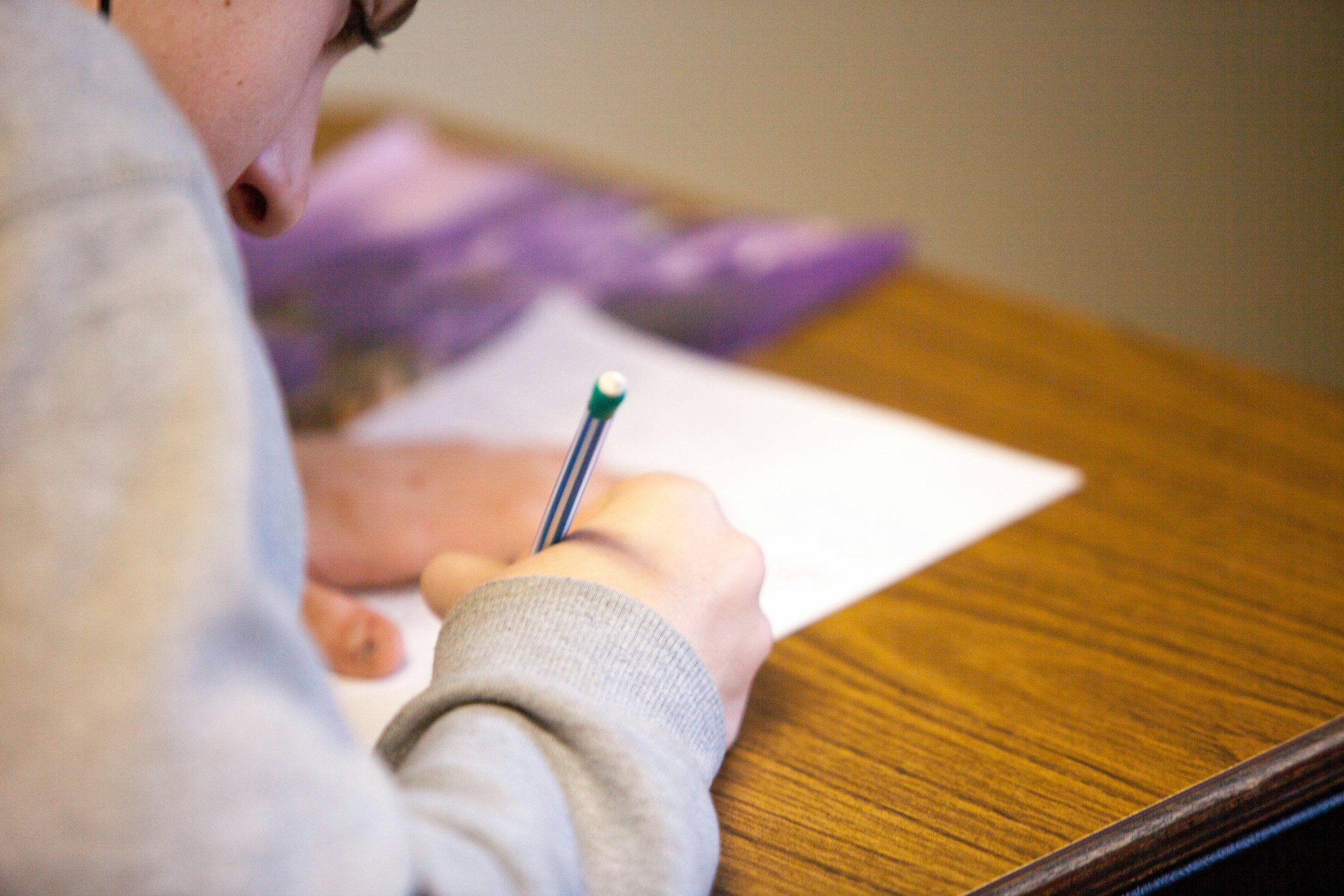
1. Use You Learn AI – Your Personal AI Tutor
YouLearn AI, or YouLearn, is an excellent resource for helping you pass your tests. It is your AI tutor, designed to supercharge your learning from YouTube videos, PDFs, and slides. Our AI chats with you about the content, provides quick summaries and breaks information into digestible chapters.
Whether you are a college student or a self-learner, we help you grasp material faster and more effectively. Just upload your content, and our AI transforms it into an interactive learning experience. With YouLearn, you're set to learn more intelligently, not more complicated. Learn anything with ease for free today with YouLearn's personal AI tutor.
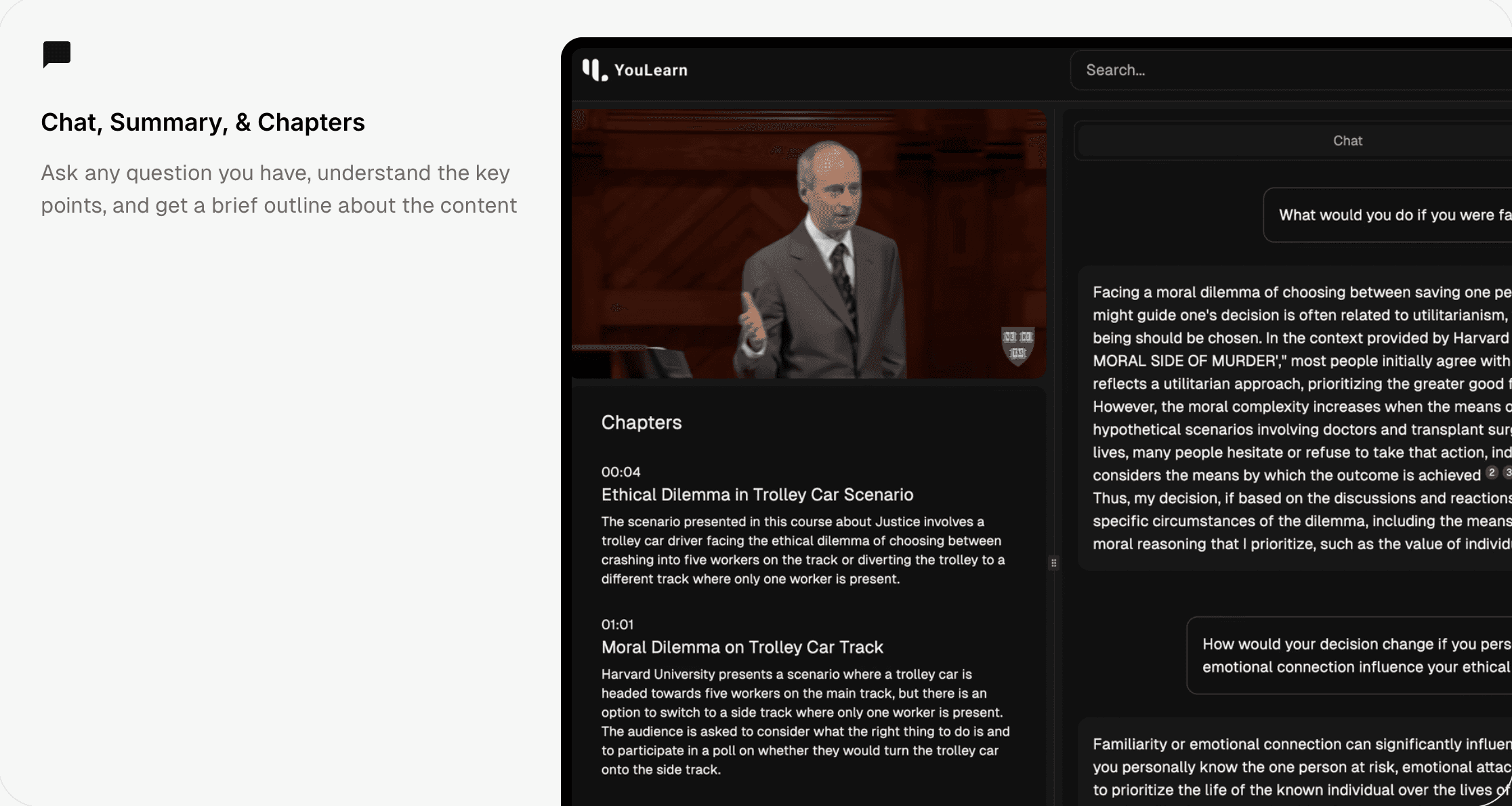
2. Start Studying in School
Studying for tests and quizzes starts well before you know you'll have a test. Good study techniques begin in the classroom as you take notes. It can take time to learn the best note-taking strategies for you. You may find you only need to write or type short phrases that will help you remember what your teacher said, or you may be someone who prefers to write down as much as possible. Some people like using a graphic organizer to take notes. These notebooks have pages with boxes or other shapes to write in that help you structure something like an essay.
Try different ways to take notes to help you decide what works best for you. Keep your notes organized by subject and ensure they're easy to read and review. This may mean you need to copy some notes at home or during a free period while the information is still fresh, but doing so will help me remember the material better.
3. Plan Your Study Time
When you sit down to study, consider how much time you want to devote to each topic. This will keep you from getting overwhelmed. If it's Monday, and I've got three tests on Friday, figure out how much time I need for each subject between now and then. Plan to do a little each day. Try breaking significant topics down into chunks. Let's say I have a history test on World War II.
Instead of thinking about studying all of World War II (which could overwhelm even an expert), try breaking my study sessions into 2-year chunks or studying the material by specific battles. Plan the length of your study sessions thoughtfully. If I plan to study for a long time, I take breaks. Be sure that your study time does not interfere with your sleeping schedule. When I get distracted, that’s a good time to take a quick break.
4. Study Based on the Type of Test You're Taking
Many teachers tell students ahead of time what the format of an exam will be. This can help tailor how you study. For example, multiple-choice questions might focus on facts and details, and essay questions usually require a more thoughtful understanding of the material and the ability to write a response. When memorizing dates, names, or other facts, remember that it usually takes several tries to remember something. So start studying early.
Flashcards can help with memorization. Some people use the “SAFMEDS” approach, “say all fast, for a minute every day and shuffled.” Verbal memory cues, known as “mnemonic devices,” can help you memorize information. Do some practice problems. Take note of any practice problems I’m struggling with and ask a teacher or tutor for help to understand them better.
5. Keep Procrastination to a Minimum
Some people work better under pressure and often wait until the last minute to start their tasks. But this doesn’t work so well for studying. You need time to digest information, but maybe you procrastinate simply because you don’t know how to start. If you procrastinate, try to overcome it by staying organized.
After I've written tests and project due dates on a calendar or saved them on my phone, it's hard to ignore them. These reminders help me plan to stay on top of my tasks. If I’m overwhelmed, don't hesitate to ask teachers, guidance counselors, parents, or other adults for help. Adults respect students who are thoughtful and self-aware.
6. Join a Study Group (or Start Your Own)
When you study with classmates, you can double-check your notes, find ways to remember the information, and test one another. You'll also hear different people explain the same concepts and explain the ideas yourself, both of which can deepen your understanding. Try going to a library if you can. The environment may make your group more likely to stay on topic and not get distracted. You can also start a group text to ask each other questions if you don’t have space to meet in person.
7. Study in the Right Frame of Mind
When you sit down to study, how are you feeling? Are you dwelling on something that happened earlier or anxious about other things you must do? You'll have trouble focusing if you’re distracted or otherwise not in a good mood. Take a moment to check in with yourself before studying. You can try strategies to improve your mood, such as breathing exercises or meditation. These can help you feel calm and confident, giving you the right frame of mind to study. Think you don’t have time? Just pausing for a minute to take a couple of deep breaths can help you clear your mind and focus better.
What Is The Pass Method In School?
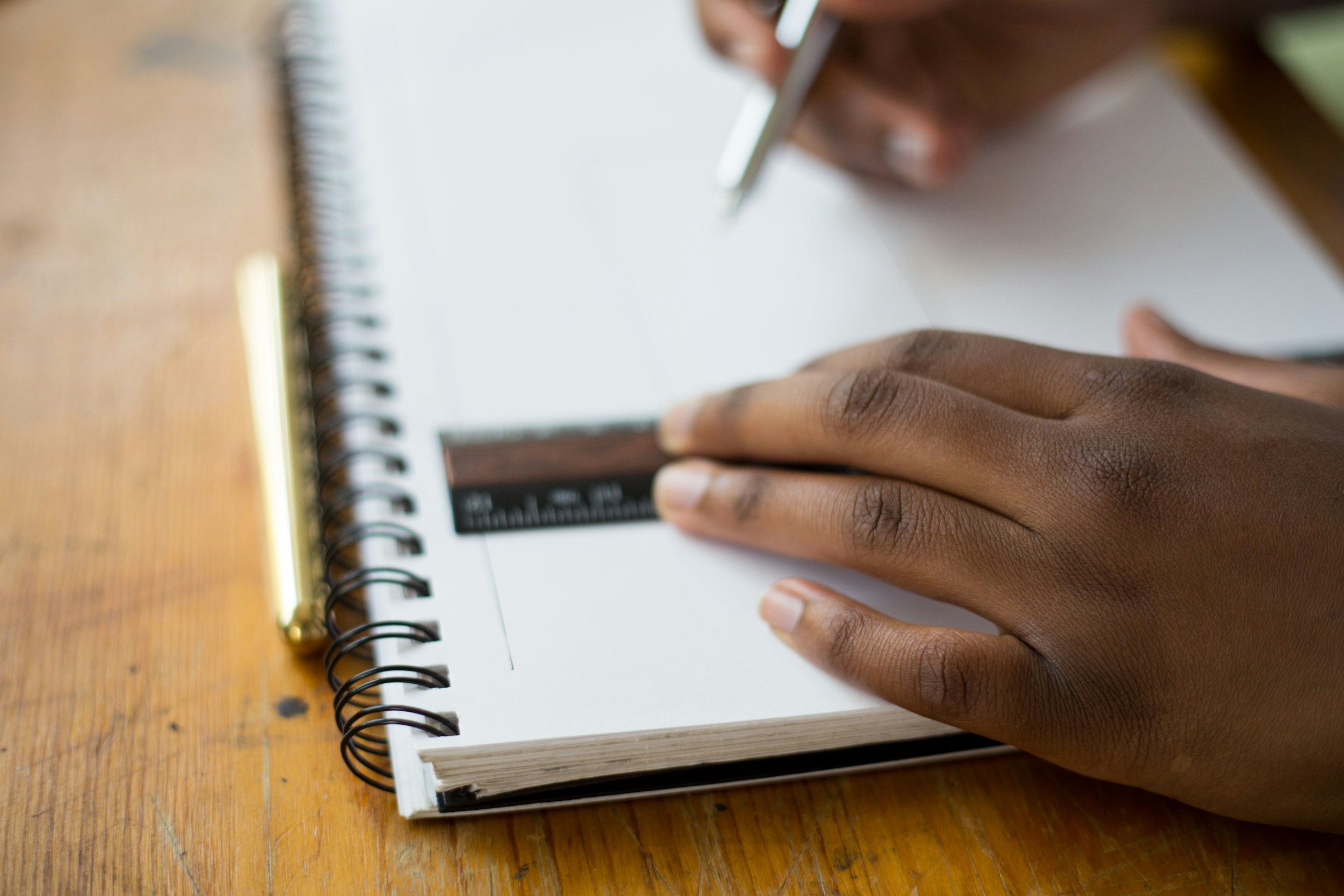
PASS is a practical approach for managing the behavior of students identified as emotionally disturbed or behaviorally at-risk. It incorporates an individualized, non-levels-based approach that provides explicit instruction of behavioral expectations in mainstream settings. The program uses a functional behavioral methodology with daily and weekly behavioral analysis to guide intervention.
What Are the Phases of the PASS Method?
PASS involves four phases of implementation:
1. Preplacement
This phase includes activities that occur before PASS placement, such as ensuring that less intensive and restrictive interventions have occurred, developing a behavior intervention plan (BIP) targeting the 2 to 3 behaviors that interfere most with the student’s academic and behavioral progress, and formally placing the student in PASS.
2. Orientation
This phase focuses on instruction. PASS specialists teach classroom expectations, monitoring, reinforcement systems, social skills in the area(s) targeted by the student’s BIP, and academic work provided by the mainstream teacher. This phase is brief and individualized. These services are provided in the PASS classroom.
3. Inclusion and Maintenance
This phase moves the student from the PASS classroom into general education or resource settings. PASS specialists monitor student behavior on a schedule designed to meet individual student needs. Reinforcement of behavioral success is critical to this phase, and social skills instruction/coaching continues. After a period of behavioral success with the behavior specialist providing monitoring, students move on to self-monitoring.
4. Aftercare
This phase encourages students who have successfully participated in PASS to sponsor students currently participating in phases 2 and 3. This phase provides mentorship for students in the program and supports the sponsor’s behavior change.
Students progress through the phases, beginning with a brief period of self-contained instruction in pro-social replacement behaviors and advancing to full inclusion with individually determined monitoring and support from the PASS specialist. The length of time any student remains in each phase is determined by his or her progress as he or she participates in PASS activities.
Student movement through PASS's second and third phases is perceived as non-linear. Instead, the services students receive are fluid and dependent on their current behavioral needs. Students may, therefore, move back to the PASS classroom for a period of redirection and from PASS monitoring to self-monitoring. Data collection and behavior analysis inform the level of service provided throughout these phases.
Learn Anything With Ease for Free Today with YouLearn's Personal AI Tutor
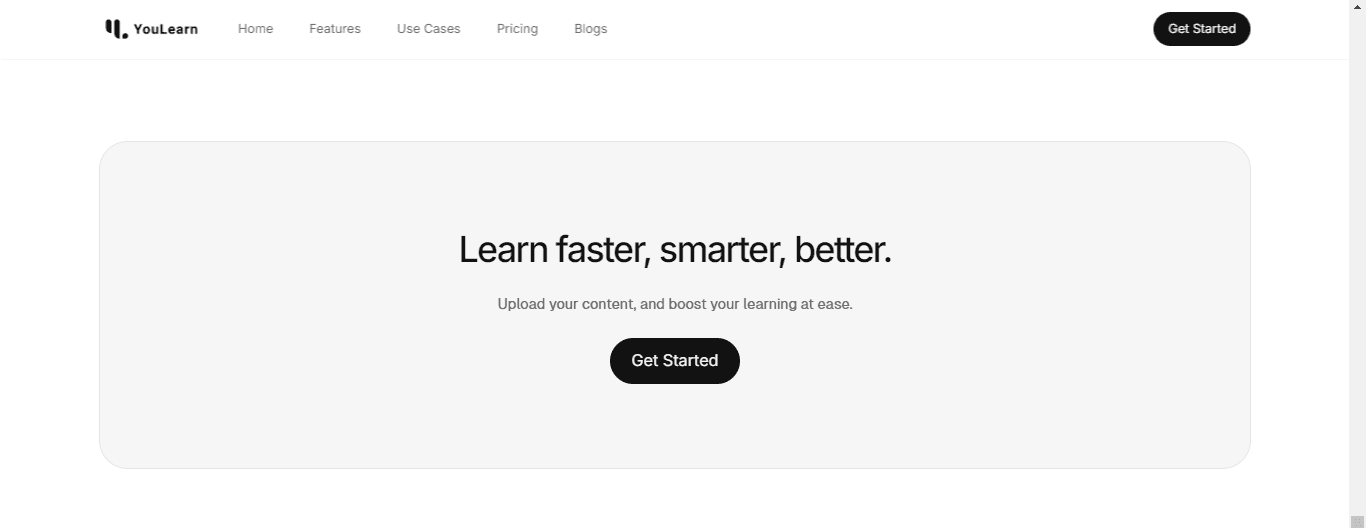
YouLearn is your AI tutor, designed to supercharge your learning from YouTube videos, PDFs, and slides. Our AI chats with you about the content, provide quick summaries, and breaks information into digestible chapters. Whether you are a college student or a self-learner, we help you grasp material faster and more effectively. Just upload your content, and our AI transforms it into an interactive learning experience. With YouLearn, you’re set to learn more intelligently, not harder. Learn anything with ease for free today with YouLearn's personal AI tutor.
Related Reading
• How to Pass a Test
• How to Be a Good Student
• Back to School Tips
23 Tips On How To Pass School With Good Grades

1. Turbocharge Your Learning with YouLearn AI
YouLearn is your AI tutor, designed to supercharge your learning from YouTube videos, PDFs, and slides. Our AI chats with you about the content provides quick summaries, and breaks information into digestible chapters. Whether you are a college student or a self-learner, we help you grasp material faster and more effectively. Just upload your content, and our AI transforms it into an interactive learning experience. With YouLearn, you're set to learn more intelligently, not more complicated. Learn anything with ease for free today with YouLearn's personal AI tutor.
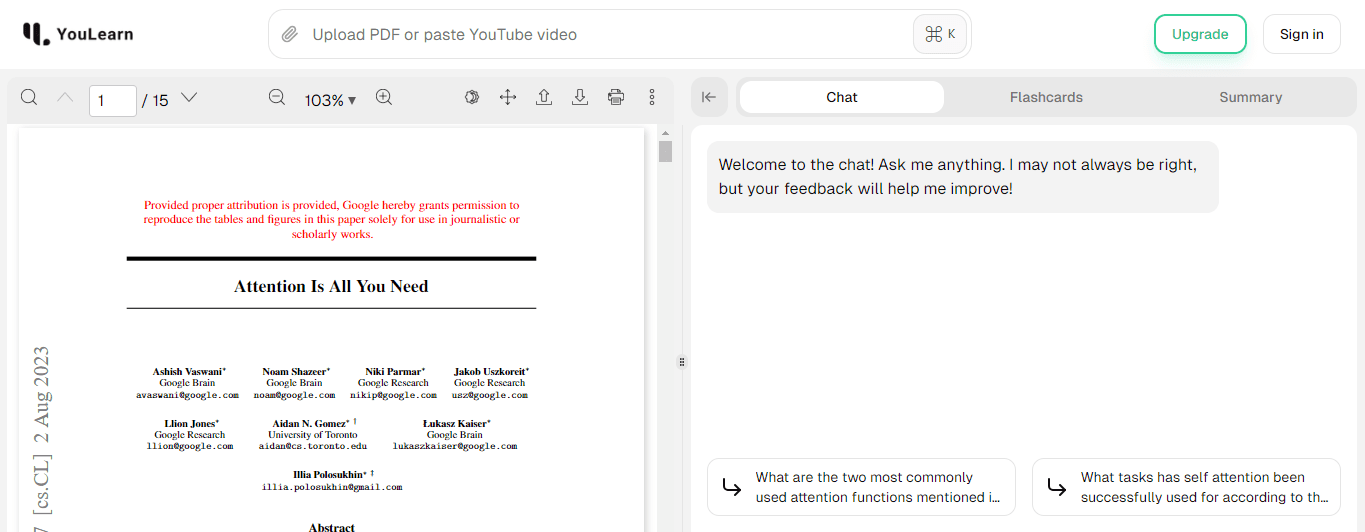
2. Maximize Every Minute in Class
To excel in school, make the most of your time in class. Attend all class sessions, pay close attention to the lectures, and take notes in a way that makes sense. The goal is to understand your notes when you review them later. If you are participating in a digital classroom session, make sure you meet the course's technical requirements by checking your internet connection and having the recommended or required equipment, such as a laptop, second monitor, and headphones, to help you.
“Taking good notes means you pay more attention during class,” suggests Oliver, a Chinese international student at the University of Kansas. “When you prepare for the test, it will be really helpful.” And if something does not make sense, raise your hand and ask, or make a note to follow up with your professor or teacher assistant (also known as a TA) after class.
3. Build Memory Skills For Tests
It’s nearly impossible to develop memory quickly, but you can improve your skill at remembering by correcting thoughts and habits. Improvement depends not on how much you use your memory but on how you use it. So, what you should do? Develop your memory for the test by paying close attention to the material you wish to remember.
Ensure you have a clear image of the face, name, date, or facts I am learning. Make them meaningful by associating them with any material I already know. Getting good sleep and eating proper meals are also essential factors for successful memorizing. While learning, try to obtain as many different kinds of impressions as possible. Do whatever works for you. Some people memorize pictures better, while others memorize sounds better.
Putting together impressions from all the sense organs makes remembering easier as we rely on sight and hearing. Try to visualize the information. Draw a diagram or graphic and take notes to visualize the material. With a good memory, you will never doubt how to pass any exam, right?
4. Studying with Classmates
In addition to making friends, forming study groups in each of your classes is a valuable and fun way to review for tests. Working together helps develop good study habits, increases collaboration on group projects, and boosts confidence. “Find a partner to compare notes with,” Oliver adds. “You can work together, study together, help each other, and push each other to be better.” It is also essential to ensure you and your study partners discuss relevant topics and stay focused!
5. Adjust Your Study Habits
It could be possible that you are studying, but it’s just not practical. Depending on the type of person you are, it could be that you’re more productive or able to retain information in the morning, but you’re finding time to study at night. Or, you may be studying with distractions, such as having the TV on or taking too many moments to check your social media apps on your phone. Whatever the situation may be, you want to allocate time to study that is dedicated and focused.
To do so, try to find a quiet and distraction-free study space, devise a schedule that adheres to your productivity levels, and study in bursts of immense focus followed by short breaks. The way you learn can also impact your study methods’ efficiency. For example, if you are an auditory learner, it will help to listen to recorded lectures or use online resources to hear the information again. If you prefer to learn visually, writing flashcards or depicting what you need to know could be helpful.
6. Use Office Hours
If you need help with a concept or topic, your professors can help. Stop by during their office hours or email questions to your professor to understand the class material better, gain helpful tips on preparing for your exams, or write a better essay. You will also create a relationship with your instructor that could lead to a valuable mentorship.
7. Switch Up Your Study Environment
Here’s an important trick you might not know: By changing your environment, you force your brain to recollect the same information in different places. That means your brain will see that material as more valuable and worth keeping. To maximize your performance, consider the context of your testing environment while studying.
If you learned it in a similar environment, it’ll be easier to recall the information during the exam. Many students prefer preparing for a test in a classroom or library. Moreover, you may learn better with a friend or as part of a team. This increases your chances of getting a high score.
8. Ask for Help
There’s no shame in asking for help. Whether you don’t understand a concept or have questions, use the educational resources around you. You can seek help from parents, peers, professors, mentors, or the internet. If you’re attending an online university (like the University of the People), use peer forums and discussion groups to connect with students like you. They may be able to offer more insight or aid in helping you understand course material better so that you can improve test scores and complete assignments.
9. Create Flashcards
It may be helpful to rewrite essential facts, concepts, and definitions on flashcards. Flashcards also let you quiz yourself without the help of others. Digital flashcards and learning apps can also assist with organizing and reviewing course material.
10. Organize Your Study Space
Dispose of any clutter you have on your table. Ensure the light is correct, your chair is cozy, and you have enough fresh air. Before starting, find what works for you and make your study space as comfortable as possible. For example, some people work better in complete silence, while others prefer having some background music. Also, your choice of furniture is a factor.
If you have an uncomfortable chair, passing an exam becomes challenging. Choose a better option and improve your concentration. Most study methods demand something specific to perform, whether taking notes or making flashcards. That’s why it’s great to have a large desk and a whiteboard to organize everything effectively.
11. Stop Procrastinating
Waiting until the last minute to start studying or begin an assignment is never a good idea. When you cram for a test, you are not optimizing your ability to understand information. Instead, you may be memorizing facts. This is detrimental in the long run because what you learn today will be the foundational knowledge you need to connect what you know tomorrow.
Procrastination may also result in missing deadlines and losing points for late work or not turning in the work. All of these negative consequences are bound to hurt your grade. On the other hand, if you get your work handed in on time and prepare for tests in advance, you have a higher chance to succeed and do well.
12. Switch It Up
Taking too much time on one subject can make you lose your concentration. One of the most essential preparation tips for college exams is changing topics every 30 minutes to prevent learning fatigue. Revisit challenging issues once you have given your brain a break.
13. Remove Distractions
If you want to study effectively, here is the kicker: Put aside your social networks, mobile apps, and computer games during your sessions. If you can’t resist the urge to check notifications or reply to messages, search for an app that will block all sources of distractions for a certain period.
14. Request Extra Credit
Sometimes, teachers are willing to offer you a second chance in the form of extra credit. Extra credit may require the completion of an additional project, a written essay, or another homework assignment. Whatever it may be, these extra points are worthwhile to claim, especially when you aren’t doing so well in a class.
15. Read and Review — Early and Often
According to the Ebbinghaus Forgetting Curve principle, we forget 75% of what we have learned within 24 hours. Going over new ideas a day after class will help increase retention and comprehension — so make time each evening for a quick review. Break chapters into sections and review the material at the end of each before moving on. Make notes by summarizing the critical aspects of the reading so you can quickly review them without rereading entire chapters. Bookmark difficult sections to revisit later.
16. Set a Goal
Set a realistic goal and determine the amount of time you are going to spend studying. Write down all of the steps in a planner. Each time you plan your study session, set a goal to understand the material thoroughly enough that you can explain it clearly to anyone. If you can set a goal, why can’t you pass an exam?
17. Find a Tutor
Tutors are available on most college campuses and are typically fellow students who specialize in or excel at a given topic. You can use an AI tutor like YouLearn.
18. Focus on Understanding
Memorizing means finding ways to remember and repeat facts. Understanding goes a little deeper and refers to how well you can apply new knowledge to various scenarios and how it relates to other concepts. College exams often test understanding, not just memorization.
19. Beat Your Test Anxiety
Wondering how to beat your test anxiety? Here you go: On the day before the exam, you probably will be feeling sick and anxious, maybe even enough to make you want to run away or murder someone. Relax—you are not the only one who fears tests. Researchers have examined this question to supply you with ways to get calm enough to recollect the correct answer during test time. Here’s one of the more surprising tips. Don’t drink coffee or tea before your test, as caffeine adds to the stress. As a result, you will probably be too pumped up to focus well on the task at hand.
Try to eat light or stay away from food altogether before the test. This ensures that your most oxygen-rich blood goes straight to your brain, not your digestive system. It’s better to take a walk to get the blood moving than to eat a huge meal. Find a comfortable outfit that won’t distract you. Also, ensure you have all the pencils, pens, and erasers you need so you won’t feel nervous about their absence.
Most importantly, be confident about your performance, and don’t worry if you feel anxious: you have already done everything you could to get ready. Don’t let yourself be distracted by other students who seem to be writing non-stop. Concentrate on your tasks instead, focusing only on how to pass your examination. Don’t be afraid to pause if needed—just close your eyes and relax with breathing exercises.
20. Don't Give Up
Perhaps the most important advice for passing a class you are failing is to keep on going! Do not give up, no matter how challenging or difficult the process may become. It is often the case that people learn best from failure, so consider your current failure an opportunity. This way, you are better able to approach the situation with a growth mindset, one that is open to learning and turning the status quo around.
21. Attend the Review Session
If your professor or teacher assistant is offering a pre-test review session before finals week, make sure to attend. This is where you can learn important information on the exam format, what may be covered in the questions, and critical topics to focus on during your studies.
22. Take Good Care of Yourself
Filling up on junk food to save time is not the most innovative strategy. Instead, keep a balanced diet of “brain foods” like fresh fruits and vegetables, balanced with protein and healthy fats to fuel your mind. The same goes for sleep: Plan to get a good night’s rest the night before the exam. While studying late the night before may be able to get you through some tests, it can also make you feel tired and unable to concentrate.
23. Learn by Teaching Others
Explaining concepts to a classmate is a great way to ensure you understand the material and help them learn. When you find new ways to explain a concept, you master the information by processing it for others.
How To Be Active In School

Commute with a Purpose and Boost Your Health
Try to walk or bike to school rather than take the bus or drive. This will not only help the environment but also get your heart pumping. If you cannot avoid a motorized vehicle, park further away and walk the extra distance. You can also add activity to your day by getting off the bus a stop or two early and walking the rest of the way.
Use Class Transitions to Your Advantage
Rather than sitting idle during breaks between classes, use this time to be active. You could walk the halls, do some quick stretches, or take the stairs instead of the elevator. Any physical activity you can do to get your blood flowing and warm your muscles up will help improve your focus and performance in your next class.
Find a Sport You Love
Joining a sports team or club at school is a great way to stay active and socialize. It brings routine, commitment, and fun to your physical activities. Plus, participating in regular physical activity will help improve your overall health so you can better deal with the pressures of school.
Related Reading
• Tips for School
• How to Do Good in School
• College Study Tips
• Best Study Method
• Study Strategies for High School Students
• Active Study Methods
How To Pass Mathematics

1. Supercharge Your Math Skills with YouLearn AI
YouLearn is your AI tutor, designed to supercharge your learning from YouTube videos, PDFs, and slides. Our AI chats with you about the content, provide quick summaries, and breaks information into digestible chapters. Whether you are a college student or a self-learner, we help you grasp material faster and more effectively. Just upload your content, and our AI transforms it into an interactive learning experience. With YouLearn, you're set to learn more intelligently, not harder. Learn anything with ease for free today with YouLearn's personal AI tutor.
2. Study Math Regularly Outside of Class
To pass math, you need to study regularly outside of class. Aim to work on math daily, even just a little. Plan to study at least two hours outside of class for every hour of class time. For instance, if you have a four-unit math class, you should study for the course at least eight hours a week. Read the textbook, take notes, and work on math problems. Make summary sheets and lists of each unit's essential theorems, properties and formulas, vocabulary words, and objectives. Review these lists daily.
3. Practice Makes Perfect
To pass math, you need to practice all types of problems consistently until you have mastered the ability to solve and check them. Be aware of what topics you know well, which ones need more practice, and which you don’t know. Continually review material from the beginning of the semester throughout the entire semester. Do your math homework before homework in other subjects so that you will be working when your mind is sharpest. If you get stuck on a problem, you can revisit it later. You will have time to get help with problems you do not know about.
4. Take Study Breaks
When studying for math, it is essential to take breaks to keep your mind fresh and alert. After a period of concentration, take a break for relaxation or to work on other subjects. You can also return to problems that you could not complete previously.
5. Make Use of Campus Resources
There are many resources available to help you pass math. Make use of them! The Academic Support Center offers free math tutoring (including online math tutoring.) Get involved in STEM groups on campus—for example, MESA, STEM Core, and the STEM Learning Center. If you have a learning or other type of disability, take advantage of the robust services offered by Mission. Use your instructor's office hours. Purchase Winning At Math by Paul Nolting in the Mission College Bookstore.
6. Study in the Right Environment
Find a quiet, well-lit place to study math. You need to be able to think deeply to learn mathematics. A noisy environment creates obstacles to concentration and distractions to focus on the problems. Make sure there is good lighting while reading and studying. Having plenty of scratch paper, graph paper, pencils, and erasers is also helpful. Colored pencils are also useful. A scientific calculator is also beneficial. If you are the type of person who learns well in a social environment, try joining or forming a study group.
Learn Anything With Ease for Free Today with YouLearn's Personal AI Tutor

YouLearn is your AI tutor, designed to supercharge your learning from YouTube videos, PDFs, and slides. Our AI chats with you about the content provides quick summaries, and breaks information into digestible chapters. Whether you are a college student or a self-learner, we help you grasp material faster and more effectively.
Just upload your content, and our AI transforms it into an interactive learning experience. With YouLearn, you're set to learn more intelligently, not harder. Learn anything with ease for free today with YouLearn's personal AI tutor.
Related Reading
• High School Tips
• High School Study Skills
• How to Study by Yourself
• How to Study Better in College

